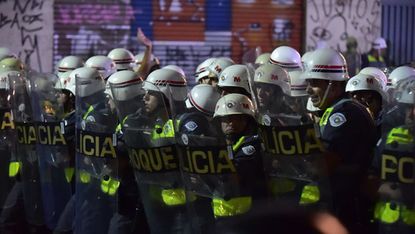Brazilian police strike weeks before World Cup begins
Police industrial action in Brazil raises safety fears as anti-World Cup protests escalate

Thousands of Brazilian police in 14 cities will strike over pay today, as street protests continue over the £10bn cost of hosting the World Cup, less than three weeks before the tournament kicks off.
The one-day strike by civil police affects several host cities including Sao Paolo, where the opening game of the tournament takes place on 12 June, and Rio de Janeiro. Officers are demanding a pay increase of up to 80 per cent.
Military and federal police, who deal with public order and more serious offences, say they also have grievances but will hold off strike action until after the World Cup, the BBC reports.
Subscribe to The Week
Escape your echo chamber. Get the facts behind the news, plus analysis from multiple perspectives.

Sign up for The Week's Free Newsletters
From our morning news briefing to a weekly Good News Newsletter, get the best of The Week delivered directly to your inbox.
From our morning news briefing to a weekly Good News Newsletter, get the best of The Week delivered directly to your inbox.
"There is no climate for a general [police] strike now in Rio de Janeiro," Roberto Alzir, Brazil's 'big events secretary', told the BBC.
The strike adds to the sense of unease stoked by waves of anti-World Cup protests. Last week 10,000 people took to the streets in six host cities to protest against the cost of staging matches, Sky News reports.
"What we want are more rights for workers to have access to housing and to show the effects the Cup had brought to the poor," Guilherme Boulos, head of the Homeless Workers' Movement explained.
Small demonstrations against a hike in transport fares spiralled into violent clashes between police and protesters, during which tyres were set alight and police fired rubber bullets and tear gas.
According to Amnesty International, the protests stem from poor public services, government corruption and forced evictions in communities surrounding some of the stadiums.
"Hosting the competition has cost the country more than it should, and in return is giving back less than it should," writes Tim Vickery of the BBC.
About 20,000 security personnel, including troops and military police, will be on duty during the tournament amid concerns over serious violence in Rio's more deprived neighbourhoods.
Create an account with the same email registered to your subscription to unlock access.
Sign up for Today's Best Articles in your inbox
A free daily email with the biggest news stories of the day – and the best features from TheWeek.com
-
 What are Lucy Letby's grounds of appeal?
What are Lucy Letby's grounds of appeal?In depth Convicted former nurse's legal team claims judge at original trial wrongly refused her applications
By The Week UK Published
-
 Grindr 'shared user HIV status' with ad firms, lawsuit claims
Grindr 'shared user HIV status' with ad firms, lawsuit claimsSpeed Read LGBTQ dating app accused of breaching UK data protection laws in case filed at London's High Court
By Rebecca Messina, The Week UK Published
-
 The best dog-friendly hotels around the UK
The best dog-friendly hotels around the UKThe Week Recommends Take a break with your four-legged friend in accommodation that offers you both a warm welcome
By Adrienne Wyper, The Week UK Published
-
 Beer sales banned at Fifa World Cup stadiums in Qatar
Beer sales banned at Fifa World Cup stadiums in QatarSpeed Read Fifa has bowed to pressure and changed its policy days before the tournament starts
By Fred Kelly Published
-
 Elnaz Rekabi: Iranian climber hailed a ‘heroine’ on return to Tehran
Elnaz Rekabi: Iranian climber hailed a ‘heroine’ on return to TehranSpeed Read The 33-year-old broke Iran’s strict dress code for women by competing without a hijab
By Mike Starling Published
-
 Maradona ‘alive and training’ at Dundee United
Maradona ‘alive and training’ at Dundee Unitedfeature And other stories from the stranger side of life
By Chas Newkey-Burden Published
-
 Football club accidentally names stand after Rose West
Football club accidentally names stand after Rose Westfeature And other stories from the stranger side of life
By The Week Staff Published
-
 Mason Greenwood: footballer arrested on suspicion of rape and assault
Mason Greenwood: footballer arrested on suspicion of rape and assaultSpeed Read Man Utd confirm the striker will not train or play until further notice
By The Week Staff Published
-
 Bosnian Serbs vote for greater autonomy, stoking fears of renewed conflict
Bosnian Serbs vote for greater autonomy, stoking fears of renewed conflictSpeed Read
By Grayson Quay Published
-
 Peng Shuai: where is China’s tennis star?
Peng Shuai: where is China’s tennis star?Why Everyone’s Talking About Global concern for sports champion who accused former minister of sexual assault
By The Week Staff Published
-
 Handball: swapping bikini bottoms for tight pants
Handball: swapping bikini bottoms for tight pantsSpeed Read Women competitors will be required to ‘wear short tight pants with a close fit’
By The Week Staff Published